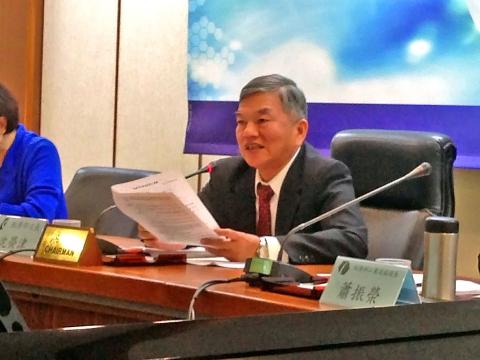Taiwan’s industrial sector could lose US$6 billion at most and at least US$2.341 billion annually in the years after the China-South Korea free-trade agreement (FTA) goes into effect, the Ministry of Economic Affairs said yesterday.
The latest impact evaluation is far less than the ministry’s previous assessment of a potential loss of between NT$260 billion and NT$650 billion (US$8.32 billion to US$20.8 billion) per year, though the ministry denied it had provided the earlier report.
The ministry attributed the lower assessment to tariff reductions by China on goods imported from South Korea being less than the ministry had expected.

Photo: CNA
“The potential impact [on Taiwan] from the FTA is limited for now, but it will still affect industries in the long term,” Vice Minister of Economic Affairs Shen Jong-chin (沈榮津) told a news conference.
The ministry’s evaluation was conducted by the Chung-Hua Institution for Economic Research (CIER, 中華經濟研究院) on the premise that the Beijing-Seoul deal is to take effect at the beginning of next year.
According to CIER’s evaluation, Taiwan’s GDP would decline by 0.04 percent after the agreement has been in effect for one year and would decline by 0.15 percent after it has been in place for 20 years, Shen said.
When asked about the huge difference between the previous evaluation and this one, Industrial Development Bureau Deputy Director-General Hsiao Chen-jong (蕭振榮) said “the ministry never provided the [previous] number.”
Hsiao said that the NT$650 billion figure was shown in previous research conducted by the Industrial Economics and Knowledge Center (IEK, 產業經濟與趨勢研究中心) of the government-funded Industrial Technology Research Institute (工業技術研究院).
“The previous evaluation was not run by the ministry,” Hsiao said.
Shen said the IEK’s research model was run under the hypothesis of a worst-case scenario, but further details of the trade agreement led the ministry to reach a different assessment.
However, both former minister of economic affairs Woody Duh (杜紫軍) and Deputy Minister of Economic Affairs Bill Cho (卓士昭) have on various occasions quoted the IEK’s study after Beijing and Seoul completed their trade talks in November last year.
Citing the latest research by CIER, Shen said that after the trade agreement takes effect, Taiwan’s petrochemical, textile and glass companies could lose US$170 million at most per year to trade that goes to South Korean firms.
Taiwan’s steel, automotive, polarizer, display and machine tool products would remain unaffected by the trade agreement in the first 10 years after the pact goes into effect, though they could lose up to US$6 billion and at least US$2.341 billion when — as the deal outlines — tariffs on South Korean goods are removed in 20 years, the CIER report said.
Shen said the research on the trade pact could help the ministry adjust its negotiation tactics for a trade in goods agreement with China.

UNCERTAINTY: Innolux activated a stringent supply chain management mechanism, as it did during the COVID-19 pandemic, to ensure optimal inventory levels for customers Flat-panel display makers AUO Corp (友達) and Innolux Corp (群創) yesterday said that about 12 to 20 percent of their display business is at risk of potential US tariffs and that they would relocate production or shipment destinations to mitigate the levies’ effects. US tariffs would have a direct impact of US$200 million on AUO’s revenue, company chairman Paul Peng (彭雙浪) told reporters on the sidelines of the Touch Taiwan trade show in Taipei yesterday. That would make up about 12 percent of the company’s overall revenue. To cope with the tariff uncertainty, AUO plans to allocate its production to manufacturing facilities in

Taiwan will prioritize the development of silicon photonics by taking advantage of its strength in the semiconductor industry to build another shield to protect the local economy, National Development Council (NDC) Minister Paul Liu (劉鏡清) said yesterday. Speaking at a meeting of the legislature’s Economics Committee, Liu said Taiwan already has the artificial intelligence (AI) industry as a shield, after the semiconductor industry, to safeguard the country, and is looking at new unique fields to build more economic shields. While Taiwan will further strengthen its existing shields, over the longer term, the country is determined to focus on such potential segments as

TAKING STOCK: A Taiwanese cookware firm in Vietnam urged customers to assess inventory or place orders early so shipments can reach the US while tariffs are paused Taiwanese businesses in Vietnam are exploring alternatives after the White House imposed a 46 percent import duty on Vietnamese goods, following US President Donald Trump’s announcement of “reciprocal” tariffs on the US’ trading partners. Lo Shih-liang (羅世良), chairman of Brico Industry Co (裕茂工業), a Taiwanese company that manufactures cast iron cookware and stove components in Vietnam, said that more than 40 percent of his business was tied to the US market, describing the constant US policy shifts as an emotional roller coaster. “I work during the day and stay up all night watching the news. I’ve been following US news until 3am

COLLABORATION: Given Taiwan’s key position in global supply chains, the US firm is discussing strategies with local partners and clients to deal with global uncertainties Advanced Micro Devices Inc (AMD) yesterday said it is meeting with local ecosystem partners, including Taiwan Semiconductor Manufacturing Co (TSMC, 台積電), to discuss strategies, including long-term manufacturing, to navigate uncertainties such as US tariffs, as Taiwan occupies an important position in global supply chains. AMD chief executive officer Lisa Su (蘇姿丰) told reporters that Taiwan is an important part of the chip designer’s ecosystem and she is discussing with partners and customers in Taiwan to forge strong collaborations on different areas during this critical period. AMD has just become the first artificial-intelligence (AI) server chip customer of TSMC to utilize its advanced